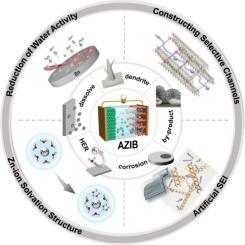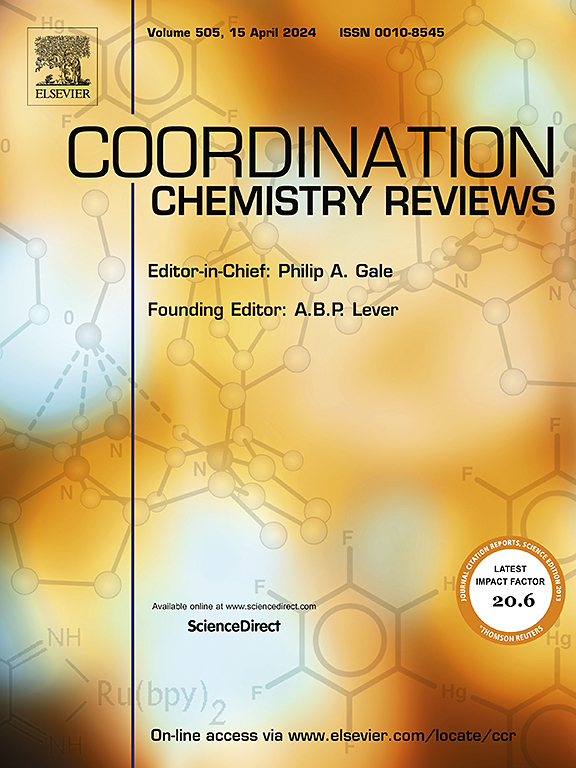Comprehensive regulation strategies for gel electrolytes in aqueous zinc-ion batteries
IF 23.5
1区 化学
Q1 CHEMISTRY, INORGANIC & NUCLEAR
引用次数: 0
Abstract
Aqueous zinc-ion batteries (AZIBs) offer a promising energy storage option thanks to their safety, affordability, and stable electrochemical properties. Nevertheless, commercialization remains hindered by challenges including zinc dendrite growth, electrolyte-electrode interface instability, and performance deterioration caused by the high activity of water. Gel polymer electrolytes (GPEs) have demonstrated significant improvements in both performance and safety of AZIBs, attributed to their flexibility and superior interfacial contact properties. This review elucidates the transformative potential of GPEs, focusing on strategies including the construction of selective ion channels, reduction of water activity, optimization of solvation structures, and stabilization of the electrode-electrolyte interface. Additionally, this review analyzes the molecular-level mechanisms underlying these strategies and explores the functional versatility of GPEs in flexible energy storage devices. The findings in this work underscore the crucial role of GPEs in overcoming key obstacles in AZIBs technology, paving the way for commercial applications and steering future research toward the creation of high-performance, safe, and eco-friendly AZIBs.


水溶液锌离子电池凝胶电解质的综合调控策略
由于其安全性、经济性和稳定的电化学性能,水性锌离子电池(azib)是一种很有前途的储能选择。然而,商业化仍然受到锌枝晶生长、电解质-电极界面不稳定以及水的高活性导致的性能下降等挑战的阻碍。凝胶聚合物电解质(gpe)由于其柔韧性和优越的界面接触特性,在azib的性能和安全性方面都有了显著的改善。本文综述了gpe的转化潜力,重点阐述了gpe在构建选择性离子通道、降低水活度、优化溶剂化结构和稳定电极-电解质界面等方面的策略。此外,本文还分析了这些策略背后的分子水平机制,并探讨了gpe在柔性储能装置中的功能通用性。这项工作的发现强调了gpe在克服azib技术中的关键障碍方面的关键作用,为商业应用铺平了道路,并指导了未来研究的方向,即创造高性能、安全和环保的azib。
本文章由计算机程序翻译,如有差异,请以英文原文为准。
求助全文
约1分钟内获得全文
求助全文
来源期刊

Coordination Chemistry Reviews
化学-无机化学与核化学
CiteScore
34.30
自引率
5.30%
发文量
457
审稿时长
54 days
期刊介绍:
Coordination Chemistry Reviews offers rapid publication of review articles on current and significant topics in coordination chemistry, encompassing organometallic, supramolecular, theoretical, and bioinorganic chemistry. It also covers catalysis, materials chemistry, and metal-organic frameworks from a coordination chemistry perspective. Reviews summarize recent developments or discuss specific techniques, welcoming contributions from both established and emerging researchers.
The journal releases special issues on timely subjects, including those featuring contributions from specific regions or conferences. Occasional full-length book articles are also featured. Additionally, special volumes cover annual reviews of main group chemistry, transition metal group chemistry, and organometallic chemistry. These comprehensive reviews are vital resources for those engaged in coordination chemistry, further establishing Coordination Chemistry Reviews as a hub for insightful surveys in inorganic and physical inorganic chemistry.
 求助内容:
求助内容: 应助结果提醒方式:
应助结果提醒方式:


